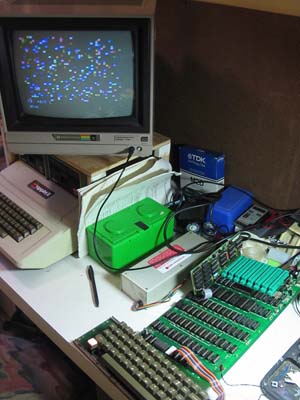
Rev 0 Replica Bringup
Start with only one bank of memory installed and no Apple PROMs.
When you first power up, immediately feel around the board for hot
chips. If any chips are hot power down immediately and check for
solder bridges on circuits connected to that chip.
If you get no video or bad video, you are going to have to go into
troubleshooting mode, but my first guess is always something relating
to the clock generation.
Here is what happened, when I brought up my very first rev 0 card.
Now I wrote a simple program that randomly plots color squares on the screen (see picture).
Tried booting DOS and it dropped to monitor instead. After thinking about it a while, remembered that I needed more than 16K ram to run DOS. Filled up memory to 48k and now I could boot DOS. Booted from all the slots successfully.
Now that Disk II is attached, I load a program that utilizes high res graphics and it is working fine.
Next I checked out the paddle and switch inputs by attaching a joystick and writing a simple basic program that prints values of paddle and switch inputs in a loop. Everything is fine here.
I now checked annunciator outputs. I simply connected a LED to a resistor. I connected one end to game port ground, and probed the annunciator outputs with the other (with LEDs you have to make sure you get the right end on ground). I toggled the outputs with the Apple monitor.
For cassette I/O, I connected an old cassette deck and tried saving and loading several basic programs. Keep in mind that for reading tapes, volume of the tape deck has to be carefully adjusted. Just to make sure everything was really good, I found an original Apple supplied tape dating from 1978 and made sure that I could read that one, as well.
For slot 0 functionality, I added a language card and checked to make sure that integer BASIC would get installed and run properly when booting DOS.
I've check 4k memory configurations, and it also looks good.
I've completed checkout of this design and have found no errors on the PCB.
Back to Mike's Hobby Home Page